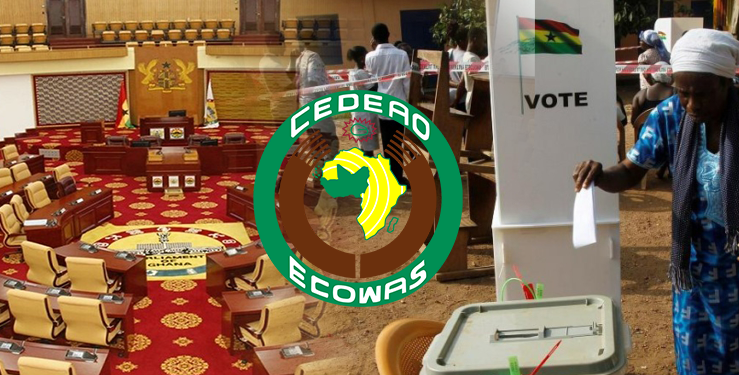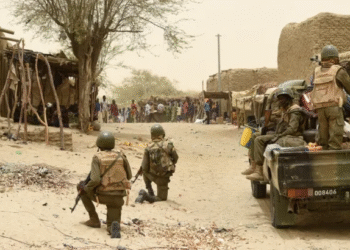Ghana’s democracy has matured to the point that one never hears any third-term talk, Ambassador Dr Abdel-Fatau Musah, Commissioner for Political Affairs, Peace and Security of the Economic Community for West African States (ECOWAS) has observed.
Apart from Ghana, Cabo Verde, Nigeria and Benin are among the continent’s democracy beacons, Ambassador Dr Musah applauded when he delivered a lecture as the guest speaker at the Council on Foreign Relations-Ghana’s fifth-anniversary lecture series at the Accra International Conference Centre on Friday, 15 March 2024, on the theme: ‘ECOWAS at the crossroads: Emerging threats, challenges, and the way forward’.
He said these countries are “increasingly demonstrating signs of maturing democratic culture and resilience, which we need to build upon, because if you look at some of the countries in the region, in Ghana, [for example], you will never ever hear the talk about a third term agenda. It is not on the cards at all. It is off the table in Ghana’s political discourse. The same thing [applies] in several other countries – Cabo Verde and others. This was not so just a few years ago. And then we have reduced open political upheaval”.
“So, when people are talking about ‘ECOWAS is collapsing’ and other things and that ‘Democracy has failed’, these are real examples that actually contradict that sort of thinking that we’ve heard about”, he argued.
Ghana’s current President, Nana Akufo-Addo, leaves office in January next year after the 7 December 2024 national elections. His government is the fifth in Ghana’s 32-year Fourth Republican dispensation under the 1992 Constitution. He served his first four-year term from 2017 – 2020. His second term ends on 7 January 2025. Mr Akufo-Addo’s government was immediately preceded by the John Mahama administration (One term: from 2012 – 2016), which was preceded by Professor John Evans Atta Mills administration (One term: from 2009 – 2012). The last seven months of the Mills administration was inherited by Mr Mahama, who served as President Mills’ Vice President before the Professor died in mid-2012. The Mills government was also preceded by the John Agyekum Kufuor administration (Two terms: From 2001 – 2004; and 2005 – 2008), which came in after the Jerry John Rawlings administration (Two terms: From 1993 to 1996; and 1997 – 2000). The late Jerry John Rawlings, who transitioned from a military leader to a civilian president, heralded Ghana into her fourth Republic with the 1992 Constitution. None of these leaders ever hesitated to leave office after they were voted out or ran out of term since the constitution has a two-term limit. Additionally, none of them ever tried manipulation or amending the 1992 Constitution to perpetuate themselves in power. This tradition of peaceful transitions has become commonplace in Ghana’s democracy, a streak which Mr Akufo-Addo has promised never to break.
Akufo-Addo: ‘I’ll hand over power; won’t impede free, fair polls nor change Constitution for another term’
He has said on several occasions that he has no interest whatsoever holding on to power after he runs out of term.
In 2021, for example, just a year after he was sworn in for his second four-year term, President Akufo-Addo promised that he will exit office when his tenure is over without seeking to change the Constitution to run for another term.
Speaking at the Kofi Annan Peace and Security Forum on Wednesday, 8 December 2021, Mr Akufo-Addo said: “As president of the Republic of Ghana and current Chair of the Authority of ECOWAS States in governance, I pledge to continue to respect the tenets of the ECOWAS protocol on democracy and good governance. I will not make or cause to be made any substantial modification to electoral laws in the last six months before the next election”, he pledged, adding: “I will respect the two-term limit for the exercise of presidential authority as stipulated in the Constitution of the Republic of Ghana”.
Mr Akufo-Addo also vowed that he will “not be an impediment to the conduct of free, fair and transparent elections”, and vowed to hand over to his elected successor. “I will hand over power to the next elected president on 7th January 2025, and I will rally my fellow ECOWAS heads of state to take the pledge and support them as they continue to work towards democracy and good governance in the respective countries.”
A stickler for democracy, Mr Akufo-Addo said: “I am, indeed, pleased to reaffirm before you, my unshakable belief in the principles of democratic accountability, which constitutes the basis of good governance in our member states”.
Akufo-Addo tackles juntas and coup mongers in Africa
When he addressed his country’s parliament on Tuesday, 27 February 2024, President Akufo-Addo complained that there was “a state of palpable anxiety and tension in every corner of West Africa, raising the spectre of regional instability, which we thought had been banished”. The Ghanaian leader, who was delivering his last State of the Nation Address, complained: “Unconstitutional changes in government in parts of Africa, especially in West Africa, through a series of coups and military interventions in governance, testify to an unfortunate democratic regression in the region”.
Mr Akufo-Addo then said it would be in the interest of democratic growth that this development is “reversed as soon as possible”, adding: “And we, in Ghana, continue to give maximum support to ECOWAS, the regional body of West Africa, and the African Union, Africa’s continental organisation, in their efforts to restore democratic institutions in the affected nations”.
“We must help stem the tide of this unwelcome evolution, and help entrench democracy in West Africa. We believe also that a reform of the global governance architecture, such as the Security Council of the United Nations, to make it more representative and accountable, will help strengthen global peace and stability, and, thereby, help consolidate democratic rule in the world”, Mr Akufo-Addo added.
The president recalled that Ghanaians have had “our fair share of political instability and experimentation about how we should govern ourselves”, noting: “There might be new names being ascribed to some of the supposed new ideas being canvassed by some today, but I daresay, on close examination, we would discover they are not new: we have tried them here, and they have failed.”
He then urged Africa to be wary of ‘saviours’ in military fatigues. “We know about all-powerful, cannot-be-questioned Messiahs; we know about liberators, and we know about redeemers and deities in military uniform. It might sound new to some, but those of us who have been around for a while have heard the argument made passionately that democracy was not a suitable form of government if we wanted rapid development.”
In Mr Akufo-Addo’s opinion, “It is a tired argument that was regularly used by coup d’etat apologists. It is also not new to have political parties and politics, in general, being denigrated, indeed, there used to be national campaigns of fear waged against politics and political parties”.
“It took time and it took long battles, but, in the end, a consensus did emerge, and we opted for a multi-party democratic form of government under the Constitution, which ushered in the Fourth Republic”, the president pointed out.
Using his country as an example, Mr Akufo-Addo said although the 1992 Constitution “is not a perfect document, Constitutions do not ever pretend to be; but it has served us well these past 32 years, considering where we have come from”. “It is a sacred document that should not be tampered with lightly, but, I hasten to add, our Constitution did not descend from heaven, we, Ghanaians, drew it up to serve our needs, and we can amend it to suit our changing needs and circumstances”. In his view, “We should work toward finding a consensus on the changes that the majority of Ghanaians want [to be] made to the Constitution. Mr Speaker, democracies are founded on elections, and the holding of free and credible elections ensures that people have confidence in the government that emerges at the end of the process”.































